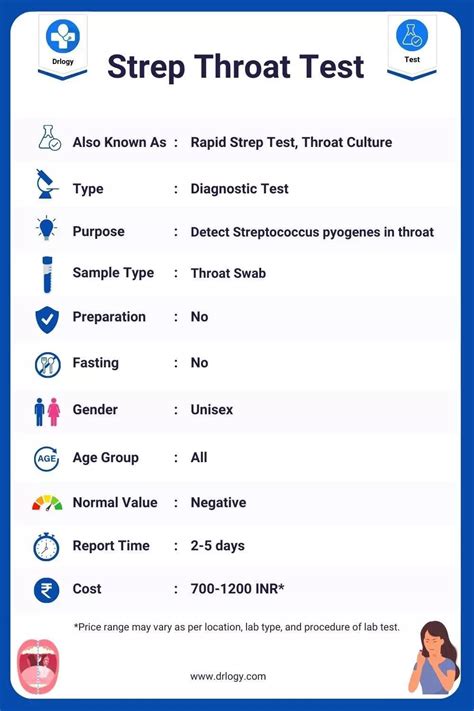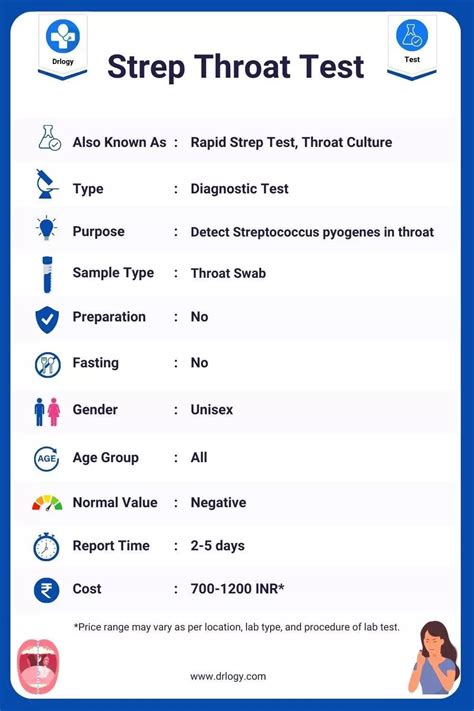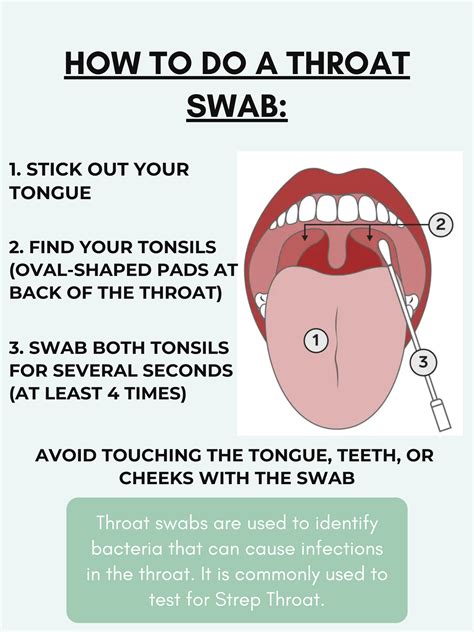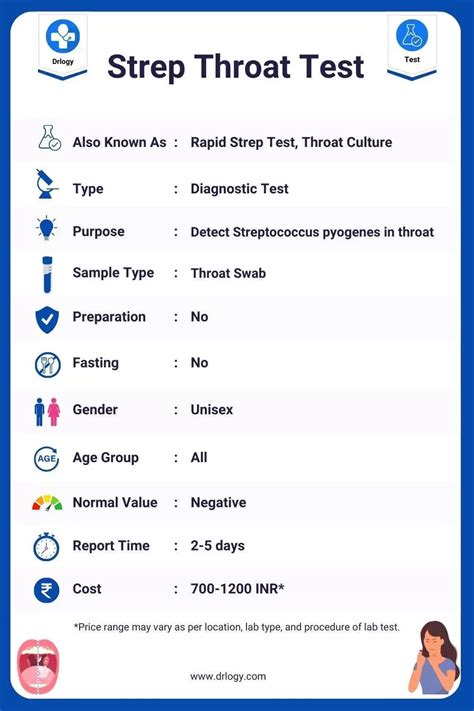Intro
Learn about the Strep Throat Test, including rapid antigen tests, throat cultures, and DIY diagnosis methods, to accurately identify Group A Streptococcus infections and get proper treatment for strep throat symptoms.
Strep throat, also known as streptococcal pharyngitis, is a bacterial infection that affects the throat and tonsils. It is highly contagious and can spread quickly, especially among children and young adults. The symptoms of strep throat can be similar to those of a viral sore throat, making it essential to get a proper diagnosis to receive effective treatment. In this article, we will delve into the world of strep throat testing, exploring the different types of tests, their accuracy, and what to expect during the testing process.
The importance of accurate diagnosis cannot be overstated, as untreated strep throat can lead to complications such as kidney inflammation and rheumatic fever. Furthermore, antibiotic resistance is a growing concern, and improper use of antibiotics can exacerbate this issue. Therefore, it is crucial to understand the different testing options available and how they can help healthcare professionals make informed decisions about treatment.
Strep throat testing is a critical component of diagnosing and managing the infection. The goal of these tests is to identify the presence of group A Streptococcus (GAS), the bacteria responsible for causing strep throat. There are several types of tests available, each with its own strengths and limitations. By understanding the different testing options, individuals can better navigate the diagnosis and treatment process, ensuring they receive the most effective care possible.
Types of Strep Throat Tests

There are two primary types of strep throat tests: rapid strep tests and throat cultures. Rapid strep tests are quick and convenient, providing results within minutes. They work by detecting the presence of streptococcal antigens in a throat swab sample. Throat cultures, on the other hand, involve sending a throat swab sample to a laboratory for analysis. This process can take several days to produce results but is considered more accurate than rapid strep tests.
Rapid Strep Tests
Rapid strep tests are widely used due to their speed and convenience. These tests can be performed in a healthcare provider's office, and results are typically available within 5-10 minutes. Rapid strep tests are relatively accurate, with a sensitivity of around 80-90%. However, they can produce false-negative results, which may lead to unnecessary antibiotic treatment or delayed diagnosis.Throat Cultures
Throat cultures are considered the gold standard for diagnosing strep throat. This test involves sending a throat swab sample to a laboratory, where it is analyzed for the presence of GAS. Throat cultures are more accurate than rapid strep tests, with a sensitivity of around 90-95%. However, the results can take several days to become available, which may delay treatment.How Strep Throat Tests Work

Strep throat tests work by detecting the presence of GAS in a throat swab sample. The testing process typically involves the following steps:
- Throat swab collection: A healthcare provider will use a cotton swab to collect a sample from the throat and tonsils.
- Sample preparation: The throat swab sample is prepared for testing, which may involve adding a special solution to help detect the presence of GAS.
- Test performance: The prepared sample is then tested using a rapid strep test or throat culture.
- Result interpretation: The test results are interpreted, and a diagnosis is made based on the presence or absence of GAS.
Interpreting Test Results
Interpreting test results is crucial for making an accurate diagnosis. A positive test result indicates the presence of GAS, while a negative result suggests that the infection is likely viral. However, it is essential to consider the limitations of each test and the clinical presentation of the patient. In some cases, a healthcare provider may order additional tests or prescribe treatment based on clinical judgment.Benefits and Limitations of Strep Throat Tests

Strep throat tests offer several benefits, including:
- Rapid diagnosis: Rapid strep tests can provide results within minutes, allowing for prompt treatment.
- Accurate diagnosis: Throat cultures are highly accurate, reducing the risk of misdiagnosis.
- Targeted treatment: Strep throat tests help healthcare providers prescribe targeted treatment, reducing the risk of antibiotic resistance.
However, there are also limitations to consider:
- False-negative results: Rapid strep tests can produce false-negative results, which may lead to delayed diagnosis.
- Delayed results: Throat cultures can take several days to produce results, which may delay treatment.
- Cost and accessibility: Strep throat tests may not be readily available or affordable in all settings, limiting access to diagnosis and treatment.
Practical Applications of Strep Throat Tests
Strep throat tests have several practical applications, including:- Clinical decision-making: Strep throat tests help healthcare providers make informed decisions about treatment.
- Public health surveillance: Strep throat tests can be used to monitor the spread of GAS and track outbreaks.
- Research and development: Strep throat tests can be used to evaluate the effectiveness of new treatments and vaccines.
Steps to Take After a Strep Throat Diagnosis

After a strep throat diagnosis, it is essential to follow the recommended treatment plan, which typically involves:
- Antibiotic treatment: Antibiotics are prescribed to treat the infection and reduce the risk of complications.
- Rest and hydration: Rest and hydration are crucial for helping the body recover from the infection.
- Pain management: Over-the-counter pain medications can help manage symptoms such as sore throat and fever.
- Follow-up care: Follow-up care is essential to ensure that the infection has been fully treated and to monitor for any potential complications.
Preventing the Spread of Strep Throat
Preventing the spread of strep throat is crucial to reducing the risk of transmission. Some steps to take include:- Practicing good hygiene: Washing hands frequently and avoiding close contact with others can help prevent the spread of the infection.
- Staying home from school or work: Staying home from school or work can help prevent the spread of the infection to others.
- Avoiding sharing personal items: Avoiding sharing personal items such as utensils, glasses, and towels can help prevent the spread of the infection.
Conclusion and Next Steps

In conclusion, strep throat testing is a critical component of diagnosing and managing strep throat. By understanding the different testing options available, individuals can better navigate the diagnosis and treatment process, ensuring they receive the most effective care possible. If you suspect you or a loved one has strep throat, it is essential to consult with a healthcare provider to determine the best course of action.
We invite you to share your thoughts and experiences with strep throat testing in the comments below. Have you or a loved one been diagnosed with strep throat? What was your experience with the testing process? Share your story and help others understand the importance of accurate diagnosis and effective treatment.
What is the most accurate test for strep throat?
+Throat cultures are considered the most accurate test for strep throat, with a sensitivity of around 90-95%.
How long does it take to get results from a rapid strep test?
+Rapid strep tests can provide results within 5-10 minutes.
Can I take antibiotics without a strep throat diagnosis?
+No, it is not recommended to take antibiotics without a strep throat diagnosis. Antibiotics are only effective against bacterial infections, and taking them unnecessarily can contribute to antibiotic resistance.
